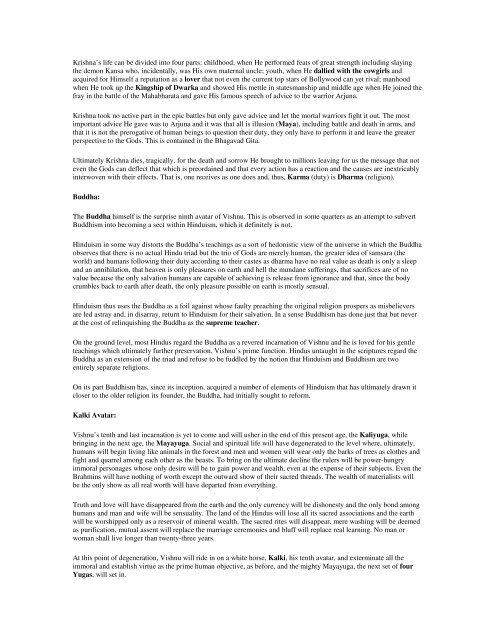Create successful ePaper yourself
Turn your PDF publications into a flip-book with our unique Google optimized e-Paper software.
Krishna’s life can be divided into four parts: childhood, when He performed feats of great strength including slaying<br />
the demon Kansa who, incidentally, was His own maternal uncle; youth, when He dallied with the cowgirls and<br />
acquired for Himself a reputation as a lover that not even the current top stars of Bollywood can yet rival; manhood<br />
when He took up the Kingship of Dwarka and showed His mettle in statesmanship and middle age when He joined the<br />
fray in the battle of the Mahabharata and gave His famous speech of advice to the warrior Arjuna.<br />
Krishna took no active part in the epic battles but only gave advice and let the mortal warriors fight it out. The most<br />
important advice He gave was to Arjuna and it was that all is illusion (Maya), including battle and death in arms, and<br />
that it is not the prerogative of human beings to question their duty, they only have to perform it and leave the greater<br />
perspective to the Gods. This is contained in the Bhagavad Gita.<br />
Ultimately Krishna dies, tragically, for the death and sorrow He brought to millions leaving for us the message that not<br />
even the Gods can deflect that which is preordained and that every action has a reaction and the causes are inextricably<br />
interwoven with their effects. That is, one receives as one does and, thus, Karma (duty) is Dharma (religion).<br />
Buddha:<br />
The Buddha himself is the surprise ninth avatar of Vishnu. This is observed in some quarters as an attempt to subvert<br />
Buddhism into becoming a sect within <strong>Hinduism</strong>, which it definitely is not.<br />
<strong>Hinduism</strong> in some way distorts the Buddha’s teachings as a sort of hedonistic view of the universe in which the Buddha<br />
observes that there is no actual Hindu triad but the trio of Gods are merely human, the greater idea of samsara (the<br />
world) and humans following their duty according to their castes as dharma have no real value as death is only a sleep<br />
and an annihilation, that heaven is only pleasures on earth and hell the mundane sufferings, that sacrifices are of no<br />
value because the only salvation humans are capable of achieving is release from ignorance and that, since the body<br />
crumbles back to earth after death, the only pleasure possible on earth is mostly sensual.<br />
<strong>Hinduism</strong> thus uses the Buddha as a foil against whose faulty preaching the original religion prospers as misbelievers<br />
are led astray and, in disarray, return to <strong>Hinduism</strong> for their salvation. In a sense Buddhism has done just that but never<br />
at the cost of relinquishing the Buddha as the supreme teacher.<br />
On the ground level, most Hindus regard the Buddha as a revered incarnation of Vishnu and he is loved for his gentle<br />
teachings which ultimately further preservation, Vishnu’s prime function. Hindus untaught in the scriptures regard the<br />
Buddha as an extension of the triad and refuse to be fuddled by the notion that <strong>Hinduism</strong> and Buddhism are two<br />
entirely separate religions.<br />
On its part Buddhism has, since its inception, acquired a number of elements of <strong>Hinduism</strong> that has ultimately drawn it<br />
closer to the older religion its founder, the Buddha, had initially sought to reform.<br />
Kalki Avatar:<br />
Vishnu’s tenth and last incarnation is yet to come and will usher in the end of this present age, the Kaliyuga, while<br />
bringing in the next age, the Mayayuga. Social and spiritual life will have degenerated to the level where, ultimately,<br />
humans will begin living like animals in the forest and men and women will wear only the barks of trees as clothes and<br />
fight and quarrel among each other as the beasts. To bring on the ultimate decline the rulers will be power-hungry<br />
immoral personages whose only desire will be to gain power and wealth, even at the expense of their subjects. Even the<br />
Brahmins will have nothing of worth except the outward show of their sacred threads. The wealth of materialists will<br />
be the only show as all real worth will have departed from everything.<br />
Truth and love will have disappeared from the earth and the only currency will be dishonesty and the only bond among<br />
humans and man and wife will be sensuality. The land of the Hindus will lose all its sacred associations and the earth<br />
will be worshipped only as a reservoir of mineral wealth. The sacred rites will disappear, mere washing will be deemed<br />
as purification, mutual assent will replace the marriage ceremonies and bluff will replace real learning. No man or<br />
woman shall live longer than twenty-three years.<br />
At this point of degeneration, Vishnu will ride in on a white horse, Kalki, his tenth avatar, and exterminate all the<br />
immoral and establish virtue as the prime human objective, as before, and the mighty Mayayuga, the next set of four<br />
Yugas, will set in.
















